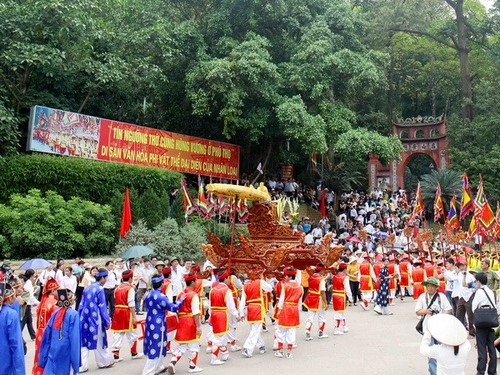 The Ancestral Anniversary festival of the Hùng Kings is celebrated for about one week at the beginning of the third lunar month. The Ancestral Anniversary festival of the Hùng Kings is celebrated for about one week at the beginning of the third lunar month. |
The Hung Kings ritual reflects Vietnamese people’s respect for their ancestors, which boosts national pride and connects the community.
Annually, millions of people converge on the Hung temple at Nghia Linh mountain in the northern province of Phu Tho to commemorate their founding fathers and pray for good weather, abundant harvests, good luck, and good health.
The largest ceremony, the Ancestral Anniversary festival of the Hùng Kings, is celebrated for about one week at the beginning of the third lunar month. Communities make offerings of rice-based delicacies such as square cakes and glutinous cakes, and there are verbal and folk arts performances, bronze drum beating, Xoan singing, prayers, and petitions. The tradition embodies spiritual solidarity and provides an occasion to acknowledge national origins and sources of Vietnamese cultural and moral identity, according to Professor Nguyen Chi Ben, a member of the National Cultural Heritage Committee.
“The worship of the Hung Kings is of great significance to the Vietnamese people’s spiritual and social life. Vietnamese institutions and royal families have all attached great importance to worshipping the Hung Kings. The tradition serves as the nation’s background, contributing to maintaining national solidarity,” said Ben.
Folklore researchers say the worship of the Hung Kings is very sacred to Vietnamese people, creating united strength for national construction and defense. Vietnamese are proud of their ancestors: Lac Long Quan, the Dragon Lord, the father of all Vietnamese people and Au Co, the Fairy Goddess, their mother. The worship of the Hung Kings embodies the Vietnamese nation’s pride and bonding. It’s the convergence of Vietnamese spiritual sentiments, reminding them of their roots and creating national solidarity.
Doctor of History Tran Van Hung of Hung Vuong University told VOV, “I think this tradition is honored thanks to its many values, including those on bonding the nation and communities, and paying tribute to the ancestors, which are the foundational factors to preserve Vietnam’s culture and promote national unity.”
There are 345 relic sites in Phu Tho province and more than 1,400 relic sites nationwide dedicated to the Hung Kings and other figures in the reign of the eighteen different dynasties of Hung Kings, from 2879 to 258 BC.